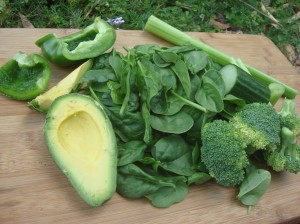Vegetables are high in antioxidants which mop up free radicals – the toxins accumulating in our body from our environment and are own body processes.
Vegetables are a fantastic source of fibre and water which keeps are bowels moving and is protective against bowel cancer
Fermentable vegetable fibre feeds and boosts good bacteria which are the most important thing for our immunity as well as the breaking down and absorption of nutrients.
Guidelines suggest 5-7 portions of vegetables every day, but if you aim to have some with every meal you will be on the right track. For example have eggs for breakfast with spinach; or have a continental breakfast with feta, ham and salad. For lunch add some rocket or watercress to your sandwich and take some carrot sticks as a snack rather than biscuits; or have soup. For evening meal aim for 2/3 portions one of which should be greens. Whilst sweetcorn and potatoes are vegetables, the amount of starch they contain means they should count as part of your carbohydrate rather than your vegetable.
The ways vegetables are stored and cooked can greatly affect their nutrients. Often frozen have more nutrients than those that have been shipped for miles, exposed to light and picked too early. Local farmers markets and local organic veg box schemes can be great for really fresh vegetables (google your nearest) but be prepared to eat what’s in season which can be limited in the winter and you need to use your imagination but squash, kale, carrots, beetroots and onions can be made into lovely soups, vegetable curries and stews and roasted with meats.
Don’t kill your vegetables through boiling or microwaving. Eat them lightly steamed, or roasted in the case of root veg. Save the cooking water if you make soups or gravy. Have some raw veg in the form of salad daily.
To summarise – eat vegetables with each meal, eat locally sourced or frozen vegetables and cook them kindly.

